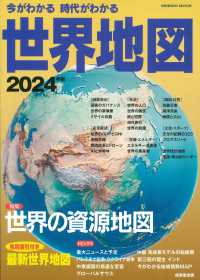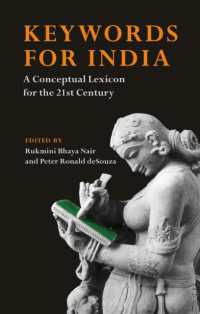Full Description
Critical Conversations in Canadian Public Law is a groundbreaking open-access collection of peer-reviewed essays showcasing interdisciplinary thinking on topical public law issues at the forefront of the evolving relationship between state and society._x000D_
_x000D_
In Canada, this relationship is undergoing a period of significant reinvention, as evidenced, for example, by the movements for reconciliation, decolonization and Indigenization, the calls to recognize and remedy systemic racism in institutions including police forces, and the recent extension of human rights protections to prohibit discrimination based on gender identity or expression._x000D_
_x000D_
These examples reveal that we are experiencing a moment where claims that challenge the normative foundations of the discipline of public law are being made in real time; claims about citizenship, rights, and access to resources and benefits; claims about what substantive and procedural fairness look like, and for whom; claims about the obligations and limits of the state to proactively address both historical and current injustices; and challenges to the underlying assumptions about the state itself._x000D_
_x000D_
Critical Conversations in Canadian Public Law highlights the intersections of critical perspectives-including intersectional approaches to decolonial and Indigenous legal theory, Indigenous constitutionalisms, critical race theory, feminisms, queer theory and critical disability theory-and public law topics, broadly defined. _x000D_
_x000D_
This collection bridges the divide between traditional, largely liberal, public law scholarship and critical perspectives by centring critical theories as not only relevant, but imperative, to robust, fully contextualized understandings of contemporary public law challenges.
Contents
Introduction
Joshua Sealy-Harrington, Karen Drake, Kyle Kirkup, Anne Levesque & Jena McGill
A. Indigenous Peoples and Critical Approaches to Canadian Law
A.1 Critical Theory and Crown-Indigenous Relations by Gordon Christie
A.2 Implementing Article 14 of UNDRIP: Indigenous Language Transmission Rights and Responsibilities by Lorena Fontaine
A.3 Critical Approaches to 'Jurisdiction': The Struggle for Control of Indigenous Lands and Resources by Dayna Nadine Scott
A.4 Four Views of Metis Constitutionalism by Kerry Sloan
A.5 Wanted: Indigenous Representation on the Supreme Court of Canada (But the Indian in the Child Must Be Gone!) by Harry S. LaForme
B. Policing, Criminal Law, and the Carceral State
B.1 Gladue Sentencing is Ordinary Sentencing by Lisa Kerr
B.2 Abolitionist Lawyers: Making Prisons Obsolete by Reakash Walters
B.3 Être puni-e sans nécessairement être condamné-e : la punitivité avant procès et au-delà de la matière criminelle en droit canadien par Véronique Fortin et Joăo Velloso
B.4 The Hunt for Red October: Critical Race Theory and Racial McCarthyism by Vincent Wong
B.5 The School Policing Origins of R v Grant by Lisa M. Kelly
B.6 An Open Letter to Legal Workers: Imagining a World Beyond Civilian Oversight of Policing by Meenakshi Mannoe
C. Boundaries and Borders of Public Law
C.1 The Xenophobic Gap in the Canadian Charter's Equality Guarantee by Y.Y. Brandon Chen
C.2 Disruptive choices: Agency, religious freedom, and veiling Muslim women in Canadian constitutional law by Ashleigh Keall
C.3 Pour une application de la Charte fondée sur les droits de l'enfant par Mona Paré
C.4 Critical Disability Theory and Public Law in Canada: The Case of Longueépée v University of Waterloo by Ravi Malhotra
C.5 Critical Perspectives in Canadian Tax Law by Samuel Singer and Allison Christians







